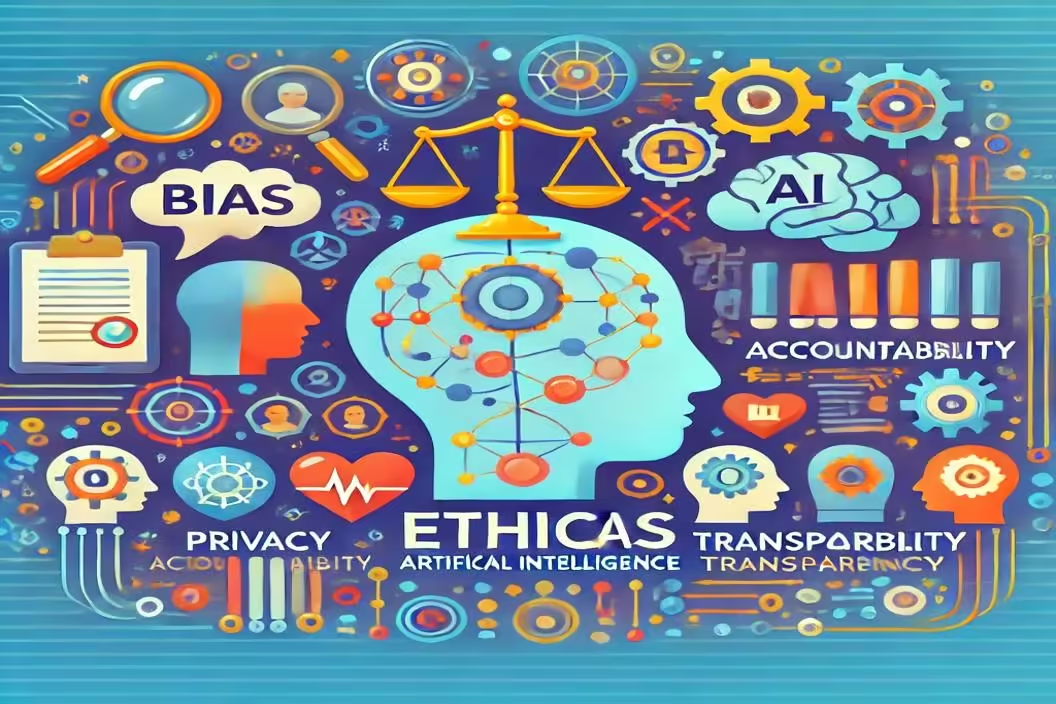Table of Contents
The Ethics of Artificial Intelligence: Navigating a Responsible Future
Artificial Intelligence (AI) is a powerful tool that is transforming various aspects of our lives. From healthcare to finance, Artificial Intelligence offers unprecedented advancements. However, with great power comes great responsibility. As AI continues to evolve, it is essential to address the ethical considerations that accompany its development and deployment. This blog post explores the ethics of AI, drawing insights from UNESCO’s recommendations and other expert sources.
Understanding the Ethical Concerns of AI
AI’s rapid advancement brings about several ethical concerns that must be addressed to ensure its responsible use. These concerns can be broadly categorized into five key areas: bias and fairness, privacy, accountability, transparency, and the impact on employment.
1. Bias and Fairness
AI systems are trained on large datasets, which often contain historical biases. If not addressed, these biases can be perpetuated and even amplified by AI. This can lead to unfair outcomes, particularly for marginalized groups. Ensuring fairness in AI requires diverse and representative datasets, along with continuous monitoring and adjustment of AI algorithms to minimize bias.
2. Privacy
AI systems often rely on vast amounts of data, raising significant privacy concerns. The collection, storage, and analysis of personal data must be conducted in a manner that respects individuals’ privacy rights. This involves implementing robust data protection measures and ensuring that users have control over their personal information.
3. Accountability
Determining accountability in AI systems can be challenging. When AI makes decisions, it can be difficult to pinpoint who is responsible for any negative outcomes. Establishing clear lines of accountability is crucial to ensure that those affected by AI decisions have recourse and that developers and organizations can be held responsible for their AI systems.
4. Transparency
Transparency in AI involves making the decision-making processes of AI systems understandable and accessible to users. This can help build trust and ensure that AI operates in an open and explainable manner. Techniques such as explainable Artificial Intelligence (XAI) are being developed to make AI decision-making processes more transparent.
5. Impact on Employment
AI has the potential to significantly impact employment, with automation threatening to displace many jobs. While AI can create new opportunities, it is essential to manage the transition responsibly. This involves reskilling and upskilling workers and ensuring that the benefits of AI are shared broadly across society.
UNESCO’s Recommendations on AI Ethics
UNESCO has provided comprehensive recommendations on the ethics of AI to guide governments, organizations, and developers in creating and implementing Artificial Intelligence systems responsibly. Some of the key recommendations include:
- Promoting Human Rights and Fundamental Freedoms: Artificial Intelligence should be developed and used in a manner that upholds human rights and fundamental freedoms. This includes ensuring that Artificial Intelligence systems do not discriminate against individuals or groups.
- Ensuring Diversity and Inclusiveness: AI development should involve diverse stakeholders and perspectives to ensure that Artificial Intelligence benefits all of humanity. This includes encouraging participation from underrepresented groups.
- Fostering Transparency and Explainability: Artificial Intelligence systems should be transparent and explainable. Users should be able to understand how Artificial Intelligence decisions are made and have the ability to challenge those decisions.
- Establishing Accountability Frameworks: Clear accountability frameworks should be established to ensure that those who develop and deploy Artificial Intelligence systems can be held responsible for their actions.
- Ensuring Data Privacy and Protection: Robust data privacy and protection measures should be implemented to safeguard individuals’ personal information.
For a more detailed overview of UNESCO’s recommendations, you can visit their official page here.
The ethics of artificial intelligence is a critical consideration as we continue to integrate Artificial Intelligence into various facets of our lives. By addressing ethical concerns such as bias, privacy, accountability, transparency, and the impact on employment, we can ensure that Artificial Intelligence is developed and deployed responsibly. UNESCO’s recommendations provide a valuable framework for guiding the ethical development and use of Artificial Intelligence. By adhering to these principles, we can harness the power of Artificial Intelligence to create a more equitable and just society.
More blogs: https://sleepingsirens.com

